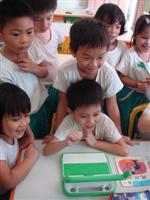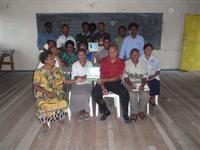Around our article on OLPC Oceania's concept paper we had a chance to conduct an e-mail interview with Ian Thomson, OLPC/RICS Coordinator, Secretariat of the Pacific Community, and Michael Hutak, OLPC Director, Oceania.
This is the second half of our extensive question and answer session with OLPC Oceania, you can read the first part here.
Which software version are the XOs being used by children in the Pacific currently running on?
Ian Thomson: We have a mix, but most are at 7.11
Will they be upgraded to the 8.2 release now that it's been finalized?
Ian Thomson: Yes
In how many of the languages spoken in the Pacific region is Sugar currently available?
Ian Thomson: We have over 800 languages in the Pacific (most are in one country, Papua New Guinea). Most islands have either French or English, but also a Pidgin common language where there are many languages. We have started some conversion Pootle projects for PNG and Solomon's pidgin and also Nauruan.
Are there ongoing efforts to produce software and content for the XO in the Pacific region?
Ian Thomson: These are major goals of our project.
Michael Hutak: You can follow our progress on this on the OLPC Oceania wiki and through the fantastic work David Leeming is doing using Moodle and also wikieducator.
How is updating thousands of machines handled in some of these remote locations?
IT: Firstly, we are supporting 22 countries and thousands of islands over an area much larger than the USA, all surrounded by water. We have a regional organisation (SPC) to coordinate activities and then hand things down to each country. Depending on the size of the country, they may have internal resources to handle support, but the smaller countries will rely on the regional body to assist.
There are logistical issues when you consider that remote islands are reached by flying into the capital city, then taking a local flight to a provincial centre, then a boat to a trading centre and then a canoe to the village. A key challenge is to build supply lines for the project and we are hopeful of using existing channels such as Government, NGOs and local businesses.
What are some of the biggest challenges that you have encountered so far?
IT: Well, getting the actual laptops has been quite a challenge, but now that we seem to have a good logistics system, I guess the next challenge is Measurement and Evaluation of projects leading to scale up.
MH: Our biggest challenge is PNG, which is the biggest country, has the most kids, and poses the most difficult logistic contexts for deployment. There's roughly a million children aged 6-12, only about half of those in formal education and about half of those again in the public school system. So we're working closely with the faith-based education sector there as well as the government. On the upside, we have very good political buy-in in the country, due largely to the incredible efforts of Dr Barry Vercoe, a New Zealand national and one of the original founders of the MIT Medialab, who spent four months over the northern summer in the Pacific, mostly in PNG, building the contacts and political goodwill to kickstart this most difficult country for us. We are close to a real breakthrough in PNG and we hope to have something to announce to the world very soon.
In terms of overcoming challenges, on the supply chain logistics, a long-term champion of OLPC in the region is Rangan Srikhanta and he has set up OLPC Australia which is providing a logistics hub out of Sydney to supply the trial deployments with XOs and peripherals. And another Sydney-based champion is Pia Waugh, an expert on open source who has just launched a local organisation called OLPC Friends which is focussing on community development in the region and building a community of practice for tech developers, users, and teachers.
What is your own background and how did you get involved in OLPC?
IT: First we should mention David Leeming, who is the OLPC project coordinator for SPC. David comes from the UK and volunteered to teach in the Solomons. He decided to settle there, eventually left teaching and started working on ICT projects and when he heard about OLPC, was instrumental in forming an ad-hoc group to see how we could get OLPCs into the Pacific. This lead to connecting with Dr Vercoe and OLPC gifting 5,000 laptops to the region and the partnership between with SPC and OLPC, so naturally, David was brought in to help roll them out.
MH: My background is in journalism and development communications and I first became involved with OLPC a couple of years ago when I was working in Rome for the United Nations World Food Programme, where I met Matt Keller who would become OLPC's director for Europe, Africa and the Middle East. After helping out in various roles I represented OLPC at the UNESCO General Conference in Paris in September last year, deputising for Matt who'd been called to Africa at the last minute. The enthusiasm I encountered for the project was enough to convince me that it was not only a great project, it had enough broad appeal to actually become a reality, so I decided I wanted to help make it happen.
I'm an Australian national and when I moved back to Oz this year it seemed a perfect timing to push for OLPC in the region, as Australia had had a change of government to the progressive Labor Party under new PM Kevin Rudd, who was elected on a platform that included more development aid to the Pacific and a local commitment to enact a "digital education revolution".
Who measures and analyzes the impact of OLPC against existing indicators?
IT: Each Ministry of Education is encouraged to develop their own M&E, but we are sharing the plans and results. The University of the South Pacific is discussing an independent review with a funder and should start this activity shortly.
MH: National ownership and community ownership is absolutely crucial. Ministers, department heads, teachers, community leaders and parents need to be fully engaged in the deployment of the XO, from the most remote village to the education minister's office. And part of that engagement is developing their own criteria for success and failure, on their own terms. This can't be imposed from outside or above, although there are of course universal baseline criteria for measuring educational outcomes.
We also want to encourage active sharing of results and lessons learned, and transfer of knowledge and skills from the rollouts and trials in the various countries.
There's also talk of a "peripherals" supply to 10000 XOs, what kind of peripherals are these?
IT: This is things like School Servers, Access Points, spare batteries, chargers, solar chargers etc.
We would like to thank Ian Thomson and Michael Hutak for taking the time out of their busy schedules to sit down for the Q&A with us. If you have any further questions please leave a comment below and we will do our best to get them answered...




Wonderful to see the OLPC being taken to PNG - I spent over two years working there with VSO (Voluntary Service Overseas) helping teachers working with kids with disabilities. I was based in Madang province.
I'd love to hear more about how it goes - particularly in PNG.
And intrigued to know how they'll get on with the language issue, and the attempts to have first language teaching in most primary schools (or Tok Pisin/ Motu in urban ones)